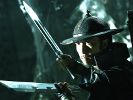Eye For Film >> Movies >> 14 Blades (2010) Film Review
Daniel Lee's 14 Blades sets itself up as pure wuxia. It opens with an authoritative voice-over setting out a brief history of the Jinyi Wei, or 'Brocade Guard', who give the film its Chinese title (they were a secret police force to the emperors under the Ming Dynasty). It features stunning martial arts sequences, blending physical action, wire-fu and CG with a variety of unusual weapons, including a boomerang sword, a roasted chicken and the Jinyi Wei commander's mechanical weapons-in-a-box device that gives the film its English title. Its plot is motivated by the court intrigues of China's past and involves a roaming hero in search of yi, or righteousness.
Its hero (Donnie Yen) was inducted into the Jinyi Wei as a young orphan through a horrific trial that required him to fight his own brother to the death. Since then, he has risen to its topmost rank, defining himself both by his unquestioning allegiance to the Guard's strict code, and by the Green Dragon tattoo that marks his commander's rank and from which he takes his name, Qinglong.

He is tormented, ruthless, a formidable fighter with a rigorous notion of duty, and living in full expectation that death's release will come to him soon. Yet when, as part of a complicated conspiracy to oust the present emperor, Qinglong finds himself betrayed by his brethren and on the run, his sense of himself is sorely challenged – while Qiao Hua (Zhao Wei), the idealistic young woman whom he has taken hostage, shows him the possibility of a different life, full of love, companionship and hope for a better future.
As Qinglong begins to change, so too does the film's generic identity – into an oater. For soon we are seeing this man with no name - in his wide-brimmed hat – joining wagon trains, riding into sunsets, and tossing dynamite into desert ravines, while being pursued relentlessly by the whip-wielding 'girl from the West' Tuo Tuo (Kate Tsui). Add to this mix the bandit Judge (Wu Chun) and a mass of gold bullion, and you have something like The Good, The Bad and The Ugly (1966) in 15th Century China.
Not that the Western is the only influence on this Eastern film. For classical mythology is evoked by the snakily Medusa-like Tuo Tuo and a 'Labyrinth' near the film's end, and there is also sweeping adventure, political intrigue, and plenty of revenge, redemption and romance. And the miracle is that it all works.
The gold, the Imperial seal, the forged documents – these are mere macguffins, as are the titular blades whose separate names and functions, though carefully listed in the prologue, are not (or at least not clearly) all seen in action, or even germane to the plot. What counts here instead are the many conflicted characters, the widescreen scale of the settings, and the thrilling energy of the action - and the result is a breathless dash through the desert, as spectacular as it is slyly sentimental.
Reviewed on: 16 Aug 2010



















